#california land development
Text
California Land Development Giants
California Land Development Giants
When it comes to California land development, Design Everest is said to be “a true One-stop solution for Land Developers” as far as land development firms go, that is. Design Everest has orchestrated over 5,000 residential and commercial projects, totaling sums of over $500 million annually in construction through their remote delivery method. They produce projects for industry partners and…

View On WordPress
#best homes 4 sale in southern california#best homes 4 sale near me#best homes for sale near me#best real estate near me#california land development#civil engineering#design everest#homes 4 sale near me#homes for sale near me#houses 4 sale near me#houses for sale near me#investment company#irvine company#land development#los angeles real estate#real estate#real estate development#real estate in los Angeles#real estate in southern california
5 notes
·
View notes
Text
Released in 2010, Obsidian Entertainment's Fallout: New Vegas actively concerns itself with the realities of gay existence, and is widely recognized as a noteworthy work of queer science fiction. New Vegas extensively examines social attitudes towards homosexuality among the game's major factions, and primarily conveys this lore through gay and bisexual characters describing their own experiences. It also allowed the player to mechanically set the Courier's sexual orientation. By taking both available perks, the player character can be bisexual. By choosing neither, the player can opt out of seeing flirtatious dialogue options.
Uniquely, Fallout: New Vegas explores homosexuality in the context of wasteland societies, and touches upon related issues. The core theme of New Vegas is that the desire to recreate the past is driven by irrational nostalgia, and any endeavor to manifest past glory is dangerous and doomed. The social issue of homophobia is used as a demonstrative example. The resurrection of corporate and military power structures presents new avenues for Old World problems such as institutional homophobia to reemerge. One of the many issues that divide the New California Republic and Caesar's Legion is the latter's open persecution of gay people. The NCR is described as tolerant and even accepting of same-sex relationships, though acceptance tends to fall off the further one moves away from the developed, urbanized core of New California.
In recent years, the Republic's rapid economic transformation has led to an unforeseen erosion of the humanitarian ideals which it was founded to serve. In practice, to recreate America was to take on its shortcomings and its sins. As subsistence scavenging has dried up, the people of the NCR increasingly turn to wage labor, entrepreneurial venture, or military enlistment to keep their families fed. Meanwhile, their government enacts morally corrosive imperialism (narrative verbiage), their dominion expanding indefinitely as their infrastructure crumbles from within. This has led to a profit-based imperial monoculture which must conquer, consume, and coerce to perpetuate. As personal politics and service labor grow in importance, people find themselves more inclined to present as "normal" in the interest of financial stability and political expedience. A loading screen visualizes this culture of artificial social normalcy: the portrait of President Aradesh on the NCR 5$ bill neglects to depict his unibrow, earring, and facial scarification, overall portraying the once-chieftain so cleanly-cut as to be unrecognizable at first glance. He also appears to be wearing a collared shirt or suit as opposed to the robe he wore in Fallout.
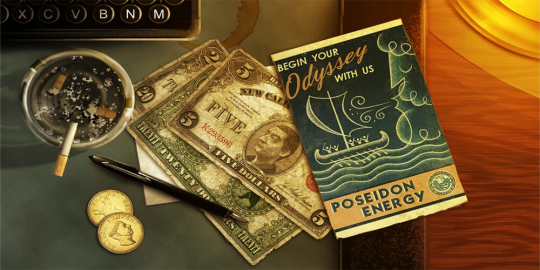
In the Legion, Caesar has mandated that every legionnaire take a wife and produce children, citing high infant mortality rates and the constant need for soldiers, and going as far as instituting child quotas. He treats human beings as a resource to be exploited for war. Ostensibly in this aim homosexuality has been declared a capital offense punishable by death. Historically, routine demonstrations of violence towards women and gay people are a deliberate feature of fascist societies, the only logical cultural conclusion of a government devoted entirely to war and control.
In Forlorn Hope letter 9, an NCR soldier wrote wrote the following to his boyfriend:
Dearest Andrew,
Writing this seems pretty morbid, but tomorrow we march into the no man's land between our camp and Nelson, which is crawling with Legion. The Major insisted I write this damn "if you get this, I'm dead" letter so here it is. What a crock. I have the luck of the devil and your love on my side, so I'll be home soon. Keep the porch light on for me.
We'll party in New Vegas when I get back.
I love you.
—Devin
Devin believed he would prevail over the Legion because his love would keep him safe. He was found dying or dead on the battlefield, the letter was found on his body. In a post-release patch, the injured soldiers were removed from the battlefield for performance reasons, and never re-implemented.
Driven largely in reaction to the Legion's hyper-masculine posturing and misogyny, rumors persist across the Mojave that gay male relationships are not only common within the Legion, but condoned. These rumors are repeated commonly in NCR society. A closeted NCR Major mentions that the Legion is "a little more... forgiving" about close male "friendships," speaking in a hushed tone to avoid suspicion. At the same outpost, the player can encounter Cass, a bisexual civilian woman. She may flirt with a male Courier, who may imply they are gay, prompting her to imply gay men are more common in the Legion. Even as gay men fight and die in the name of love under his command, NCR General Oliver may remark to Courier Six at the Second Battle of Hoover Dam: "If you think after all that's happened, I'm going to grab my ankles and take it like the Legion..."
This writing pertains to institutionalized homophobia which manifests in practice though power structures and social interactions without being written into law. Simply put, in his derogatory remark, the general expresses to his army that military surrender is gay, much like their gay enemy. From the brevity and bluntness of this remark, it's clear that this sentiment is already well understood among his ranks. Logically, to project strength in the eyes of such a leader, one might also project homophobia by scrutinizing and harassing one's peers and subordinates. In this atmosphere, the expression of homophobia is not only normalized, but materially incentivized. For the ambitious, it becomes a tool, and a way of casting shame upon rivals. For the closeted, homophobia becomes a survival tactic, hoping to throw scrutiny off oneself. This is why Major Knight is immediately frightened when a male Courier flirts with him. He is so profoundly alienated that he romanticizes life as a gay man under the Legion. The Legion punish homosexuality with death, and yet Knight characterizes them as more "forgiving" than the NCR. Through these apparently disparate events, the audience can trace how a distorted perception of gay people emerges among insecure men in a military environment, and subsequently becomes ingrained in the corresponding civilian culture.
At the 188 Trading Post, a lesbian from the Brotherhood of Steel named Veronica also wryly remarks that she believes legionaries have gay sex about as often as straight sex. She also notes that this only applies to men, as women have no rights whatsoever in Legion society. In this aside, she conveys a pre-existing frustration with lesbophobic social norms. Veronica also mentions that the people of her bunker would rather she remain on the surface.
The Mojave Brotherhood of Steel has no official policy prohibiting homosexuality, but an implicit attitude among its dominant members that their limited numbers require everyone to have children to avoid extinction. Numerically, this may seem logical on the surface, given their reluctance to recruit outsiders. However, given their tiny population, this is an ineffective countermeasure, as they do not have nearly enough members to maintain genetic diversity for more than a few generations. This approach is not universally supported by all family units within the Brotherhood, but every individual is ultimately at the mercy of the elder. Veronica was in a lesbian relationship, but they were quietly separated by Elder Elijah, due to the dominant culture of enforcing heterosexual pairing among their population.
Caesar's law has not ended homosexuality within his domain. Despite the obvious risks, some legionaries have continued to pursue relationships behind closed doors, especially given their access to slaves. So long as members complete their societal obligations and fulfill the child quotas, they are able to pursue romance with other men in secret. Homosexual relationships in the faction are noted as being relatively equal compared to the average Legion husband and wife, in a "Don't Ask, Don't Tell" sort of open secret policy. Gay legionaries must always make sure to keep their activities hidden.
A centurion was once almost caught fraternizing with the teenage boy he had chosen to tend his tent. Despite previous "romantic" intentions, he quickly resolved to dispose of the slave to dispel suspicion. Had they been caught together, the centurion would have been charged with homosexuality and sentenced to death. This story is only known because the enslaved young man, Jimmy, managed to escape execution. Further illustrating the cruelty intrinsic to Legion governance, it's stated that homosexuality was the crime, and not the rape of a young slave; in fact, it seems Jimmy was forced to contribute to the child quota despite being a gay teenager, and the experience left him traumatized. He has resolved to never have sex with another woman, as the very notion triggers memories which fill him with disgust, and (in his own words) makes him feel like a slave all over again.
The Strip is indifferent to gay people, viewing them as another opportunity to make caps. Both the Gomorrah and the Atomic Wrangler are interested in maximizing profits, and their prostitution services cater to clients regardless of their orientation. The openly gay Jimmy works at nearby Casa Madrid, but there is some tension among his peers due to his co-worker Maude's blatant homophobia. She supposes he's "okay, for one of those," and if propositioned by a female Courier, Maude will direct them to Sweetie for such "perverted" services. Pretty Sarah must regularly intervene to keep the peace among her staff.
The Followers of the Apocalypse, well-read punks who seek to embody healing through anarchistic values, are not concerned with gender. Most are openly and casually sexually active. Upon meeting Courier Six, Arcade Gannon offhandedly makes his gayness known, unprompted. The audience must face the fact that Arcade's apprehension of the Legion is far from abstract; under Legion law, he would be put to death. One possible ending gives further insight into Caesar's hypocrisy: should the player sell Arcade into slavery and leave Caesar alive, he will keep Arcade as a personal physician and philosophical advisor. They intellectually spar at length, and Caesar grows singularly fond of him. Accordingly, Arcade imitates the historic suicide of Cato the Younger by disemboweling himself. The Legion's remaining medics attempted to save his life, but none were Arcade's equal. Caesar understood his doctor's final gesture of contempt, and mourned him for months.
New Vegas ventures further into themes of healing from the trauma of sexual violence, from the perspective of a lesbian character. Corporal Betsy, an NCR sharpshooter, is a rape survivor, and suffers with PTSD from the incident. Her unprocessed trauma has manifested as a maladaptive tendency to aggressively and explicitly proposition the women she encounters, in an effort to reassert a sense of control. This defensive hypersexual impulse has negatively impacted her ability to connect with other women. A male superior officer notes that her behavior is inappropriate for anyone of her stature, but abstains from disciplining her out of sincere concern for her mental health. The Courier can help her begin to recognize these problems, and convince her to seek treatment from Doctor Usanagi at the New Vegas medical clinic, which proves helpful to her as she processes and heals from her trauma.
In Old World Blues, the Think Tank are five floating brains in jars who express themselves by waving robotic arms bearing screens depicting facial features. Before the War, they were federal scientists who committed crimes against humanity in the name of weapons development. Each is stuck in some sort of neuro-bionic feedback loop which prevents them from moving forward with their projects, mentally binding them to their central laboratory. Walking through their homes at Higgs Village, it's clear each was deeply neurotic before they were transformed into floating brains.
Now without bodies, they attempt to maintain the illusion that they are exempt from sexuality as purely mental beings, but each displays obvious interest in the human form. They have codified this shaming with the term "formography." Most of the men are obsessively defensive over their complete disinterest in penises, which they talk about constantly. However, the shameless Dr. Dala shows overwhelming interest in observing and recording any and all human functions. Already androgynous in her pre-War life, Dala has taken to self-identifying as a "gender neutral entity" (though she is not known to use they/them pronouns). Regardless of the Courier's gender, they may coquettishly scratch themselves, clear their throat, and stretch in front of Dala until her biomed gel decoagulates. Dr. 8 also responds positively to graphic masturbation advice from Couriers of either gender.
The X-8 research facility is ostensibly a massive immersive shrine to Doctor Borous's hatred of Richie "Ball-Lover" Marcus, a long-dead child who bullied Borous centuries ago. He also clings to his resentment of one Betsy Bright, who refused to attend a dance with him, supposedly so she could "go smoke with RICHIE MARCUS." Clearly arrested in development, Borous has literally built a temple to the fantasy of torturing his adolescent romantic rival and feeding him to dogs. His frozen, static characterization of the jock Richie Marcus as a "pinko-commie" who "likes balls" reflects the shallowness, pettiness, and overall misanthropy underlying his patriotic identity.
It remains apparent throughout Old World Blues that the Think Tank are all chronically sexually repressed, which is inseparable from the values of the violent and judgmental pre-War culture which created them. With time and isolation, this ingrained repression has manifested as various intense and deranged psychosexual behaviors, including rage-fueled homophobia, voyeurism, and the obsessive performance of puritanical pretense.
____
“Although I’ve been out for a very long time, I made a conscious effort to be out with relation to this project, as I wanted to be visible as a lesbian in the game industry. New Vegas itself is, I think, one of (if not the) best games out there in how we treat homosexuality – and all of that is very intentional.”
“If my work on FNV, if my being out has helped even one gay person, then I have succeeded.”
— Tess “Obsidian’s Gay Cowgirl” Treadwell
____
written (with help from other editors) for fallout.fandom.com/wiki/LGBT_representation_in_the_Fallout_series
criticism welcome
2K notes
·
View notes
Text
It’s fucking insane to me how normal Yankee Liberals are about Hawaii. As in like the way they just treat it as an unremarkable fact that their nation controls the island. Like the annexation of Hawaii wasn’t just any old example of Settler-Colonialism, the subjugation of a decentralised non-urbanised people that could be just dismissed as mere “tribes” or what have you. Not to say that such forms of “typical” Settler Colonialism are any less abhorrent or disgusting, just easier to justify from a Liberal point of view. Easier to claim that they weren’t *really* using the land properly or that they were an hopelessly and eternally backwards who only really benefitted from their conquest or that they were doomed and dying anyway and their fate was a mere tragic inevitability not worth dwelling on or…
Point is all these arguments are all wrong and stupid and cruel but they can serve well enough to downplay or justify such atrocities in the eyes of Imperial Core Liberals.
But like with Hawaii you don’t have that. The Kingdom of Hawai’i was a sovereign state that was internationally recognised as such by the Great Powers of Europe even at the very height of Western Imperialism. Literacy rates were high and compulsory education was introduced in 1841 (pre-dating the US by 77 years), healthcare was given to all Hawai’ian subjects free of charge, Christianity was dominant (so even the most ardent Imperialist couldn’t claim that the people were in the thrall of some “barbaric superstition” that necessitated the “civilising influence” of empire) and it had a well-developed Capitalist economy dominated by Sugar production. Like even if we take the Western model of statehood as the be all end all of what separates the civilised from the savage (to be clear hear you really fucking shouldn’t, but many people do so for a second that’s the frame of reference we’ll employ) then Hawai’i was very much unambiguously the former. But that didn’t stop the US from shamelessly interfering it’s politics Indeed those aformentioned markers of Western-Style “civilisation” and “development” came with the price of allow US missionaries and investors to settler in the islands and become very wealthy and influential. For decades the US used the threat of force to influence the policy decisions of the kingdom, going as far as to regularly send warships in a classic display of “gunboat diplomacy”. In 1887 a US settler militia called the First Honolulu Rifles staged a coup where they forced Kalākaua to accept a new Constitution that heavily favoured the interests of USamerican settlers who had grown very wealthy through their investment in sugar production on the island. It stripped the Monarchy of much of its power and introducing requirements for voting that heavily favoured US settlers; re-introducing wealth/property requirements that were now higher than even, allowing resident aliens to vote and just outright banning any Asian immigrants from voting (which at that point had as much to do with plain racial hatred as it did to any acting threat they might have posed). This wasn’t enough for the Yanks and 6 years later a group of 13 US settlers known as the “Committee of Safety” outright overthrew the newly crowned Queen Liliʻuokalani when she refused to co-operate. It existed briefly as an “Independent” USamerican dominated republic before the US government decided to official annex it in 1898 (similar to what you saw with Texas or California).
While incredibly controversial at the time due to both strategic concerns with the annexation of ultramarine territories and some level of outrage at the shameless take-over of a sovereign nation (hence the time gap between the coup and the actual annexation), nowadays Yanks enjoy their control over the island without the slightest care in the world. They even turned it into a tourist destination, a heavily romanticised one that not only receives many millions of visitors every year but is constantly mentioned in the popular culture the US then proceeds to export all over the world, literally revelling in their land that is by literally any definition (even the most nakedly pro-imperialist) stolen. The land itself is severely exploited to the point of significant ecological damage, the indigenous peoples too are exploited as many of them live in poverty while US investors grow wealthy from their land and labour. Even their very culture is stolen and monetised, the most marketable parts bastardised into cheap kitsch and the rest of it left to rot, only kept alive through over a century of continued resistance from the indigenous peoples. It’s a very common story of course, but I think it stands out with how utterly ghoulish it is even under the most Liberal of consistently applied worldviews. It would be like if in say 2007 someone set up Disneyland in Bagdad. And yet by the vast majority of the US (and by extension the vassals states whose view of the situation is filtered through the lens of US media and propaganda) it isn’t seen that way. Hawaii is just the 50th state, the only state outside North America and in the tropics (hahaha ain’t that a neat little fact. Geography is so fun J), an island paradise perfect to visit with the whole family and yet still as American as Apple Pie. Even many self-described “progressives” talk about it in this way, at most mentioning the plight of the indigenous Hawaiians with minimal though as to how this situation came about. Like while the story of Hawaii is far from unique; even in terms of the US doing colonialism to Westernised peoples you examples such as the ethnic cleansing of the Five Civilised Tribes from the Eastern USA, it still stands out to me with the sheer level of international recognition and Western-style development that the Kingdom of Hawai’i possessed. Like it’s just such an obvious example of the naked greed at the heart of the USamerican empire, and how utterly bullshit talk of a “civilising mission” and “spreading democracy” is. No matter what they may claim, no matter what excuses they may trot out, Imperialist rapacity has no limits.
1K notes
·
View notes
Text
Imagine that a century or two from now, the eastern half of the United States is conquered by the Canadian Empire, its intelligentsia deported, its land colonized by Canadian immigrants, and its remaining people mostly gradually absorbed into a Neo-Canadian identity. The West reorganizes, developing a new political and cultural center, and comes to regard itself as the "true" United States, with the remnant culture of the East (by now much changed by Canadian rule) as representing an unchanged tradition stretching back to the time of George Washington. The holdout western half is subsequently conquered by the Reformed Mexican Empire, and while most of the population remains in situ, its elite is taken to Mexico City. There, for three or four generations, they do their best to maintain their distinct American identity, focusing on the American "civil religion," the distinctive political ideals and cultural features that mark them out as Americans, and come up with a new way of interpreting their history that allows America to be a perennial idea, something not directly physically tied to the territory of the United States, which no longer exists. They compose a body of historical works based on Washington Irving's rather fabulistic approach to early American history, the half-remembered popular versions of the stories of Columbus and the Pilgrims, the First Thanksgiving, even the Revolutionary War. They don't have access to the original texts anymore--let's say this is all taking place in a post-Collapse North America where long-range travel and communication is difficult and a lot of history has been lost--but they do their best. They append to these books, or include in their text, of history a copy of the Constitution, big chunks of the United States Code, and Robert's Rules of Order.
Subsequently, the Empire of Gran Columbia invades, conquers southern and central Mexico, and its Emperor lets the captive Americans go home. They return north, mostly to California, find that the version of American history and civics that is remembered there isn't the same as the version they have (not that the Californian one is correct--the Mexican Empire has suppressed English-language education and high culture in its Aztlani provinces), and set about reforming and reorganizing the Western States (as they're now called) to be more in line with the forms they brought back from the exile. In the meantime, other bits of important literature start being kept in libraries next to copies of the received histories: some bits of early American literature, like Hawthorne, the Song of Hiawatha, some highly abridged Herman Melville, Thomas Paine--heck, even some John Locke, and quotes or fragments from Shakespeare. Some traditionalists now argue the capital of the United States has always been located in San Francisco, and that Washington, D.C. only because the capital later, under the influence of Eastern heretics.
In the following centuries, the Western States retain their independence for a time, but eventually become a secondary battleground for a lot of other empires--the Mexicans, the Canadians, the Pan-Pacific Federation, and so forth. American culture remains distinctive, insulted in part by its unique traditions, though now everybody speaks Future Spanish, and only learns English to read the old texts. In this period additional material, including later compositions, continues to accrete, forming a distinct body of sacred American scripture, although it does not exist in a single canonical form. Attempts to reconcile distinct sources, like more literal and historically-grounded accounts versus the simplified narratives of figures like Irving, produce hybrid texts that sometimes are full of internal conflicts.
Oh, and through all this, some institutions of American government like the Supreme Court still function, although their rulings only apply to Americans, and there isn't much in the way of a federal bureaucracy.
Finally the Great and Sublime Brazilian Potentate conquers most of the Americas, sets up an American client state that roughly coincides with the heartland of the old Western States (California, Oregon, most of Washington and Nevada), and allows the Americans to elect their own President (subject, of course, to Brazilian approval). During this period, an apocalyptic street preacher from Los Angeles claims to have inherited the authority and power of George Washington, and is executed by the Brazilians; his later followers point to the prophecies of Emperor Norton, and out-of-context bits of a Quebecois translation of Moby-Dick and some Mark Twain stories to say no, really, he was George Washington. Inexplicably, a version of this religion becomes the dominant faith of the Brazilian Empire before it collapses. But long before then the American state in California fails, crushed when it tries to revolt against Brazilian rule; the remnant Easterners likewise dwindle down to only a few hundred souls living in a village in Alexandria, Virginia. Centuries from now, as the descendants of the descendants of the Brazilians colonize Mars, they will point to the sacred Americanist scriptures, the Neo-Americanist narratives of their prophet's life, and the letters written by the early leaders of Neo-Americanism, and say, "all of this was written by the spirit of George Washington, and is free from contradictions." Meanwhile the remnant Americanists, who have been writing about Americanism and how it applies to their everyday lives in the centuries since, and whose commentary has formed around the copies of the last editions of the U.S. Supreme Court Reporter (SCOTUS managed to outlast the final American state by a hundred years or so) plus the thoughts of the remaining Americanist community in Mexico, continue to regard their traditions as the unbroken and unaltered practice of American culture, politics, and ideals as they existed since the Revolutionary War.
This is, as far as I can tell, approximately how the Bible was composed.
1K notes
·
View notes
Text
Research by Clay Trauernicht, a fire specialist at the University of Hawaii, and others has shown that the scale and frequency of wildfires have been increasing across in Hawaii from the early 1900s to the 2010s. The researchers also identified a major culprit: non-native plants.
“Wildfires were most frequent in developed areas, but most areas burned occurred in dry non-native grasslands and shrublands that currently compose 24 percent of Hawaii’s total land cover,” the researchers wrote. “These grass-dominated landscapes allow wildfires to propagate rapidly.”
The non-native grasses were brought to Hawaii by cattle ranchers in the 19th century, University of California Santa Barbara ecologist Carla D’Antonio told me. “They were selected because they were drought tolerant.”
They are also invasive. The abandoned sugar and pineapple farms across the state are quickly taken over by non-native grasses. “When the land gets abandoned, the grasses are the first invaders. All you need is a little drought to have a flammable landscape.” Maui is currently in a drought.
The grasses are an especially potent fuel, D'Antonio explained, because they grow quickly when it rains and then stick around, deeply rooted into the soil, as dry, dead organic matter, becoming a “standing layer of very ignitable fuel.”
Then after a fire, these non-native plants tend to do better than native ones, thus increasing future fire risk. Fire “has generally been shown to decrease the abundance of native woody plants because nonnative, invasive, fire-adapted plants out-compete natives for resources in the post-fire environment and tend to dominate post-fire communities,” according to a United States Forest Service review.
490 notes
·
View notes
Text
While I was writing this to you, Janet Napolitano, the former U.S. secretary of Homeland Security, assumed her new post as the twentieth president of the University of California system, the first woman to occupy the office. The revolving door between institutions of policing, bordering, surveillance, incarceration, illegalization, militarization, and schooling is not new. Indeed, in San Diego, where I am based, Alan Bersin was superintendent of public schools from 1998 to 2005, after three years of running U.S.–Mexican border law enforcement for Attorney General Janet Reno under President Clinton. After his stint governing schools, Bersin governed the border (again) in 2009, this time for the Obama administration, working as ‘border czar’ under Janet Napolitano, then Homeland Security secretary, now UC president. However, it would be a misguided comparison to describe the bodies of faculty and students as analogous to the bodies of detainees and deportees and migrants and suspectees. It is not analogous power but technologies of power that recirculate in these imperial triangles, for example, debt financing, neoliberal market policies, information systems, managing noncitizen populations, land development. If we consider triangular connections between war abroad and refugee management within, antiblackness and the maintenance of black fungibility and accumulation, and militarization and Indigenous erasure throughout empire, then we can understand why the governors of war and the governors of schools can have similar résumés, without pretending that the governed suffer through identical conditions.
la paperson, A Third University Is Possible (Duke University Press, 2017), pp. 37–38.
120 notes
·
View notes
Text
Aight thoughts on todays bbh lore cuz we got A LOT. Just stay with me through my nerding about trees it’ll be worth it XD
We pretty much got 100% confirmation that he is intentionally hurting Baghera and Forever and that he thinks of himself as expendable. What fascinates me the most is when Bad asked Foolish this
“Is there anything wrong with burning the forest to save the trees?”
At first glance you might think YES if u burn the forest then there won’t be any trees??!! However it is a custom on fire risk zones to create controlled fires that burn up brush and dead trees so that the risk of a natural and far more devastating fire is reduced. Additionally, if a fungus infects a forest, burning the infected trees may be the only way to prevent the spread to the rest of the forest.
On top of that, there is a specific type of tree species that requires fires in order to reproduce. These are often Pine trees that drop pinecones. Pinecones hold seeds inside them that only germinate when immense heat is applied to them: the heat of a forest fire. When they are within these temperatures, the seeds germinate and the pine cones pop, scattering the seeds on the forest floor. These trees adapted to form a symbiotic relationship with fire one of if not the most destructive natural forces on the earth.
Do you know one of the trees that has developed this adaption? Redwoods.
Do you know which tree bbh brought up when giving Jaiden a PINECONE gift for her birthday today? A Redwood.
I’m like actually going insane. This can’t be a coincidence right????? I’m not going crazy right???
The whole reason I noticed this scene is because I live near the redwood forests in California and I know all about the way these trees depend on fires for their survival. It’s something that’s always fascinated me. That’s when I assume Bad was going to ask foolish the above question before Jaiden and Teana cut their conversation short while they were talking on the Titian . He literally had these specific trees on his mind when he was going to ask about burning down the forest.
Let me tell you another thing about Redwood trees. They are ancient. They are massive. They are sturdy. Natural fires are a common phenomenon here and a majority of the redwoods survive with barely a scratch, maybe an inch or two of its outer bark scorched. Nothing it won’t grow past in a year or two when these trees easily live for 500+ years.
(Side note, if there is one place in America you should visit it’s the redwood forests of California. It is literally like entering a portal to another world. These trees are 10-15 ft in diameter easily and you can just feel how ancient the forests are. It’s one of my all time favorite places to go)
So, in the situation Bad is proposing, burning the forest to save the trees, he is actively thinking about Redwoods in this hypothetical. Not only trees that are extremely resistant to fire but trees that depend on fire to survive. That completely changes the way he is approaching this question.
In his hypothetical, the forest will burn. The animals will die. The brush and non redwoods will turn to ash. The land will be scarred and the trees themselves may look dead, branchless and black. But. But. A season will pass and new branches will peel through the charcoal. Seeds deep in the soil will surge forth as the soil is fed nutrients from the ash. Animals will return. Pinecones will shed their fertilized seeds to give birth to a new generation of trees. And by next year, the forest will look just as vibrant as it had before the fire. Trees may bear the scars of the flames but life continues and it continues and it continues always.
I might actually be going crazy bbh makes me crazy cc!bbh makes me crazy I’m losing my mind
#qsmp#crimson speaks#badboyhalo#look#biology and ecosystems was a major hyperfixation in high school#like science in general has been one of my special interests since I was a baby#and I just so happen to have an intimate knowledge of redwood in particular#cuz I used to spend my summers camping in these forests#also#don’t tell me they are called sequoias#we use redwood and sequoia interchangeably#and I grew up calling them redwoods#but seriously I’m actually losing it over BBH’s lore today#he planted that pinecone and redwood mention INTENTIONALLY#KNOWING HE WAS GONNA ASK FOOLISH ABOUT BURNING THE TREES#AHAHHAHAHAHAHAHAHAHHAHAAHAHAHA#SCREAMING CRYING THROWING UP#he’s so fucking insane#and amazing at planting and pay off#omfg
277 notes
·
View notes
Text
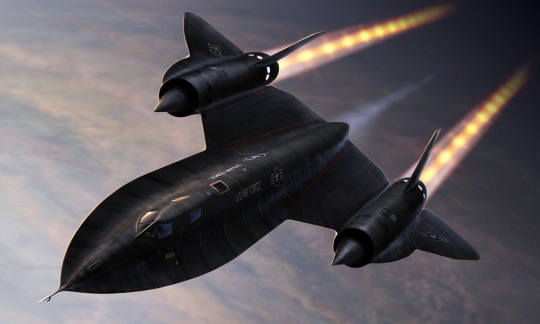
Blackbird pilot recalls when his SR-71 Flew so Fast that he and his RSO Landed at Beale AFB almost a Day Before They Took Off from Kadena AB
SR-71 Pilot tells the story of when his Blackbird flew So Fast that He and his RSO arrived at Beale AFB almost a Day Before They Left Kadena AB
The SR-71 Blackbird
The SR-71, the most advanced member of the Blackbird family that included the A-12 and YF-12, was designed by a team of Lockheed personnel led by Clarence “Kelly” Johnson, then vice president of Lockheed’s Advanced Development Company Projects, commonly known as the “Skunk Works” and now a part of Lockheed Martin.
SR-71 T-Shirts

CLICK HERE to see The Aviation Geek Club contributor Linda Sheffield’s T-shirt designs! Linda has a personal relationship with the SR-71 because her father Butch Sheffield flew the Blackbird from test flight in 1965 until 1973. Butch’s Granddaughter’s Lisa Burroughs and Susan Miller are graphic designers. They designed most of the merchandise that is for sale on Threadless. A percentage of the profits go to Flight Test Museum at Edwards Air Force Base. This nonprofit charity is personal to the Sheffield family because they are raising money to house SR-71, #955. This was the first Blackbird that Butch Sheffield flew on Oct. 4, 1965.
The Blackbird design originated in secrecy during the late 1950s with the A-12 reconnaissance aircraft that first flew in April 1962 and remained classified until 1976. President Lyndon Johnson publicly announced the existence of the YF-12A interceptor variant on Feb. 29, 1964, more than half a year after its maiden flight. The SR-71 completed its first flight on Dec. 22, 1964.
The Blackbird was designed to cruise at “Mach 3+,” just over three times the speed of sound or more than 2,200 miles per hour and at altitudes up to 85,000 feet.
Blackbird pilot recalls when his SR-71 Flew so Fast that he and his RSO Landed at Beale AFB almost a Day Before They Took Off from Kadena AB

David Peters in SR-71’s cockpit
The incredible speed of the SR-71 Blackbird
So, it comes as no surprise if, thanks to its astonishing flight characteristics, the aircraft has set numerous speed and altitude records throughout its career.
To give a real perspective of the incredible speed the iconic Blackbird could attain, SR-71 pilot David Peters tells the following, fabulous story.
‘We were TDY to Det. 1 at Kadena AB, Okinawa. One of the birds was scheduled for swap out and my back seater, Ed Bethart, and I were to fly it home. The replacement came in on Friday and we were to leave Saturday morning. So, in true Habu tradition we welcomed the incoming crew and went to happy hour Friday evening at the officers’ club.
SR-71 Pilot tells the story of when his Blackbird flew So Fast that He and his RSO arrived at Beale AFB 17 1/2 Hours Before They Left Kadena AB

David Peters and Ed Bethart
A true story
‘We got up Saturday morning and got ready to go home. Departure was scheduled for 1000. Everything went well and we departed right on time. Headed out to do a pass through the Korean DMZ then into the tankers in the Sea of Japan. Good refueling and climb out headed for the Sea of Okhotsk and the Kamchatka peninsula of Russia and from there to more tankers off of Adak in the Aleutian Islands. Another good refueling and on to Beale AFB California.
‘We arrived with a low approach pulled up into a closed pattern and landed. Following de-suiting and debrief we deposited our classified flight documents jumped in a car and arrived at the officers club for Friday night happy hour at 1630 17 1/2 hours before we left Kadena.

SR-71 print
This print is available in multiple sizes from AircraftProfilePrints.com – CLICK HERE TO GET YOURS. SR-71A Blackbird 61-7972 “Skunkworks”
‘Try that in any aircraft other than the SR-71. Besides this is actually a true story.’
Be sure to check out Linda Sheffield Miller (Col Richard (Butch) Sheffield’s daughter, Col. Sheffield was an SR-71 Reconnaissance Systems Officer) Twitter Page Habubrats SR-71 and Facebook Page Born into the Wilde Blue Yonder for awesome Blackbird’s photos and stories.
Photo credit: David Peters and U.S. Air Force
@Habubrats71 via X
245 notes
·
View notes
Text
Today's Wet Beast Wednesday is about sea otters. I was originally going to do this last week in honor of the 24th birthday of Rosa, the world's oldest sea otter (and one of the oldest sea otters on record) but, well, I forgot. But better late than never.

(Image: a sea otter on its back, yawning)
The sea otter (Enhydra lutris) is one of only two otters to live in salt water, the other being the rare and poorly-understood marine otter (Lontra felina). Otters are aquatic mammals of the family Mustelidae, which makes them cousins to weasels, badgers, wolverines, and martens. While many mustelids can swim, otters have adapted to a primarily aquatic lifestyle. Sea otters are divided into three subspecies: the Asian sea otter (Enhydra lutris lutris) which lives from northernmost Japan up through the northwest Pacific, northern sea otter (E. l. kenyoni) which lives from Alaska down to Oregon, and the southern sea otter (E. l. nereis), found in California.
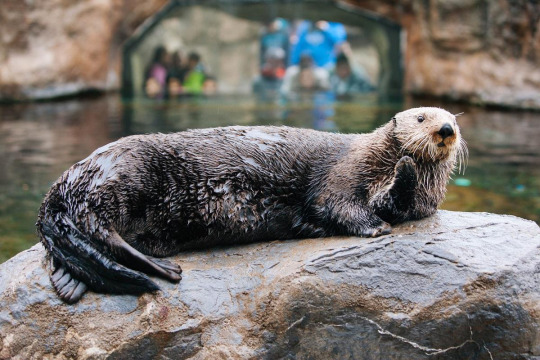
(image: a sea otter relaxing on a rock)
The sea otter is one of the smallest marine mammals (only the marine otter is smaller), yet it is also the heaviest of all mustelids. Males are larger than females, averaging between 1.2 and 1.5 meters (3'11" to 4'11") and 22 to 45 kg (49 to 99 lbs). Females average 1 to 1.4 m (3'3" to 4'7") and 14 to 33 kg (31 to 73 lbs). I honestly thought they were around the size of cats and was surprised to find out how big they can get. Otters are the most recent of the marine mammals and have not developed the thick layer of blubber other marine mammals use to keep themselves warm. Instead, sea otters warm themselves with the densest fur of any mammal, with almost a million hairs per square inch. The fur has two distinct layers: a longer layer of waterproof guard hairs and a shorter underfur layer. The guard hairs keep the underfur dry and trap air between the layers. This air gets heated by the otters body heat and provides an extra layer of insulation. This is the same principle that wet suits work on. The air layer also provides some added buoyancy. Sea otters are positively buoyant and can float on the surface of the water. There are many other adaptations to an aquatic lifestyle that sea otter have. Their feet are webbed and have long digits, allowing them to act as flippers but also making them slower and more clumsy on land. The front claws have retractable claws and pads that let them grab onto slippery objects. When swimming, they use their entire real bodies, but primarily their hind feet, for propulsion. They can hold their breath for up to five minutes and have whiskers used to search for food in darker water. Their ears and nostrils close when submerged to keep water out. While sea otter can, and often do, move around on land, they are capable of living their entire lives in the water. Some evolutionary biologists think sea otters represent an early stage of marine mammal development and can compare them to more established marine mammals like cetaceans and pinnipeds.
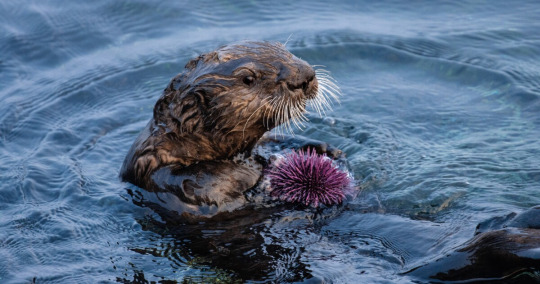
(image: a wet weasel holding a sea urchin)
Sea otters are carnivores whose diet consists mostly of hard-shelled invertebrates, though they will also eat fish. They forage for food on the sea floor in dives that usually last a minute. Their paws give them an advantage over other marine mammals, who can only use their mouths for capturing prey. Otters by contrast can pick up and move rocks and dig into the sediment. They are the only marine mammals to catch prey with their paws instead of teeth. Otters carry prey to the surface and eat while floating on their backs. Famously, they use rocks to break open the hard shells of their prey, making them one of the relatively few mammals to use tools (though tool use is proving to be more common than previously thought). Under each arm is a pouch of loose skin that is used to hold prey and rocks. Each otter has a favorite rock that they carry with them. Sea otters have blunt teeth used to crush through prey's shells.
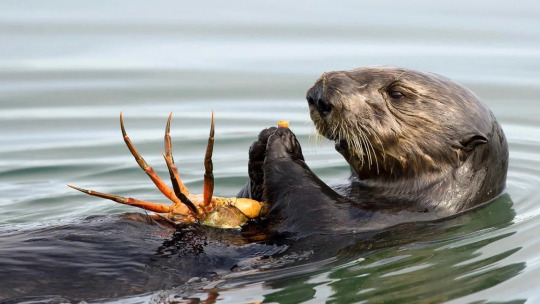
(image: an otter dining on crab)
While sea otters do spend a lot of time in groups, they are not considered truly social animals as they forage, groom, and defend themselves on their own instead of with help. Groups of otters are called rafts that typically have between 10 and 100 members, but can reach up to 2000 members. Rafts are single sex, each having only male or female members. When resting, raft members will hold hands to keep themselves from drifting apart. One social behavior they engage in is play, which is done frequently. Mating season happens in autumn. During summer and autumn, males will attempt to establish territories and push other males out. Females mover between territories at will. Males without territories will swim around and attempt to find females in heat. Males will attempt to mate with multiple females. During estrus, the males and females will bond through play and sometimes aggressive behavior. When mating, the male will bite the female's head, which can leave scars. Otters are capable of delayed embryo implantation, where they can wait for several months between conception and the embryo beginning development. Pregnancy lasts four months and typically results in a single pup. While males are absentee fathers, females are very caring mothers who spend almost all their time caring for their pups. The only time she leaves her pup will be when diving. The pup will be left floating on the surface, often wrapped with kelp to keep it from floating away. The baby will cry for its mother until she comes back. The mother will teach her pup how to dive and forage as it ages. Pups will stay with their mothers for 6 to 8 months (longer in colder areas), and sometimes until they are fully developed. Childless females will foster orphaned pups. Females reach sexual maturity at age 3-4 and males around age 5. They average 10 - 15 years in the wild and can live significantly longer in captivity. The oldest living sea otter is Rosa, living in the Monterey Bay Aquarium, who is 24 years old. The oldest sea otter on record was a female named Etika who lived to be 28.
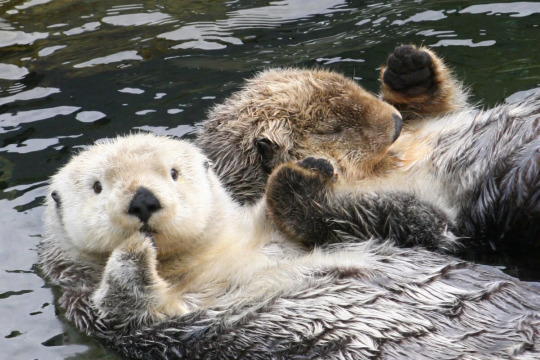
(image: two sea otters holding hands)
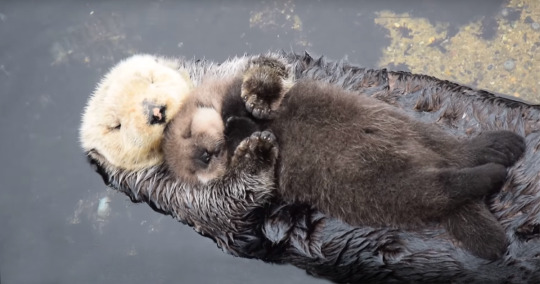
(image: a sea otter mother sleeping with its baby on its stomach)
Sea otters are a classic example of an endangered species. They have been hunted throughout history for their fur. Eventually, this reduced the world population to less than 2000 individuals. They are now the target of conservation measures worldwide and local and international protections, which has helped the population rebound. They still have not regained their historical population or range, though reintroduction measures have helped them reestablish in historical territories. The southern sea otters are the most endangered. Famously, almost all southern sea otters alive today are descended from a group of 50 discovered in 1938, when the subspecies was almost extinct. Sea otters are classified as endangered by the IUCN. Sea otters are a keystone species, having a major ecological impact on their habitats. Famously in California, the near-extinction of southern sea otters resulted in a population boon of sea urchins (their primary prey) which proceeded to kill vast areas of kelp forest. Curren threats include predation, pollution, and habitat loss. Oil spills are particularly devastating to sea otters, as the oil destroys the air layer in their fur, destroying their ability to keep themselves warm.
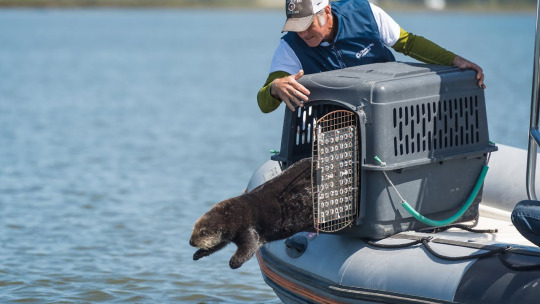
(image: an employee with MBARI releasing a rehabilitated sea otter back into the wild)
#wet beast wednesday#sea otter#otter#marine mammals#wet weasel#water weasel#moist mustelid#marine biology#biology#zoology#ecology#animal facts#adorable
293 notes
·
View notes
Text
youtube
Secrets of the Octopus Garden revealed!
Just offshore of Central California, deep below the ocean’s surface, thousands of octopus gather near an extinct underwater volcano. Welcome to the Octopus Garden, the largest known aggregation of octopus anywhere in the world.
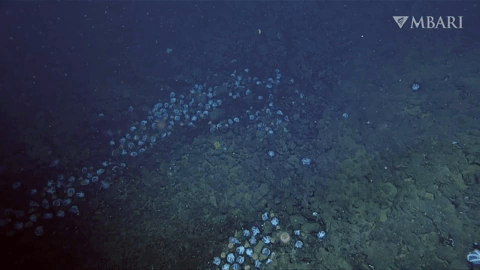
In a new study published today in Science Advances, a team of researchers from MBARI, NOAA's Monterey Bay National Marine Sanctuary, Moss Landing Marine Laboratories, the University of Alaska Fairbanks, the University of New Hampshire, and the Field Museum confirmed that deep-sea pearl octopus gather at the Octopus Garden to mate and nest.
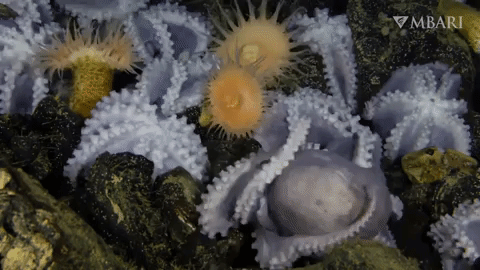
Female octopus nest in cracks and crevices bathed by warm water. Using high-tech tools, including many instruments designed by MBARI engineers, the team revealed how warmth from deep-sea thermal springs accelerates the development of octopus eggs. Scientists believe the shorter brooding period increases a hatchling octopus’ odds for survival.

The size of the Octopus Garden—likely more than 20,000 total octopus nests—and the abundance of other marine life that thrives there underscore the need to understand and protect the hotspots of life on the deep seafloor from threats like climate change and seabed mining. Learn more on our website.
212 notes
·
View notes
Text
timestamp: stark
it’s 11:33 am when you make chan an offer he can’t refuse.
๑彡 bang chan x gender neutral!reader
๑彡 slice of life!au, stranger!au — little fluff(?)
๑彡 paragraph format — 0.9K words
masterlist

[gif’s full credit belongs solely to its owner]
๑彡 oh? what’s this? a kpop-related post after two months? unbelievable. (in all seriousness, i’ll try to get back to this side as soon as i get my muse back here o7 for now, please enjoy!)
๑彡 if there are any stay-mcu/iron man enthusiasts out there, this one’s for y’all *insert dancing emoji*
You were having the time of your life.
It was not your first time visiting Disney California Adventure nor Disneyland, but the excitement you felt was still as intense as the first time. Perhaps it was because there were huge gaps between your visits. Or because there was really just something in the Disney air that never failed to make you giddy.
Whatever the case was, you always looked forward to your Disney trips. And this was no different.
Since your visits were far apart, there was always something new in the parks whenever you visit again. Regardless of your attachment to the media that inspired the new attractions, you were always excited to explore the new additions.
For this visit in particular, you were extra hyped. Not only was there a new land of attractions, the area in question was also inspired by a media that you were very familiar with.
Avengers Campus.
You wouldn’t call yourself a Marvel fan — nor a Marvel Cinematic Universe fanatic. If anything, you were just someone who watched enough of their releases to develop attachments to their characters.
Most people head straight to Radiator Springs Racers once the rope dropped. But you? You were dead-set on spending your early hours exploring Avengers Campus. So you did.
Two rides in, your feet brought you back in front of the Avengers Headquarters.
And there, right in front of the Avengers’ logo on the wall, was Iron Man — taking photos with visitors.
Frankly, you had no plans on paying Disney photographers to take your photos. For one, you didn’t research how much their services were. Second, you figured you would succumb to capitalism in other ways (read: churros and Dole whip), so it’d be best if you’d only spend your money there.
Yet, still, you found yourself lining up to take photos with Iron Man.
The line wasn’t terribly long, but you knew it’d be a thirty-minute wait at least. After all, it wasn’t just a photo-op — it was also a quick meet-and-greet. Thankfully, you were in no rush, so you didn’t mind the wait.
You let your mind wander to pass time. You observed different people interact with Iron Man as their turn came and passed. You scrolled through your phone, switching applications mindlessly.
Amidst your thoughts about which continuity Disneyland’s Iron Man existed in, you caught the cast member beside you talking to another guest. "—Mr. Stark has a meeting to attend to soon, but he’d be back after."
It didn’t take you that long to piece what that in-character response must’ve meant, especially if the other guest walked away upon hearing them.
"Excuse me," you turned the cast member’s attention toward you, "can you hold my place for a second?" As an afterthought, you quickly added: "I’ll be back. I promise."
You jogged after the other guest before you could change your mind.
Really, there was absolutely no need for you to do this. As you heard the cast member say, there would be other opportunities to meet Iron Man throughout the day.
Yet, somehow, you felt strongly compelled to. Like you were supposed to.
"Excuse me," you called your fellow guest’s attention. You flashed him a small smile, "Hi."
"Hello," he greeted back after halting to hear you out. He reciprocated your gesture with one that almost blinded you, "Can I help you?"
"Are you still interested in taking a picture with Iron Man?"
"I am," he affirmed.
"Do you wanna take it with me?" You blurted out your objective for coming to him, before he could say anything else. "I mean," you backtracked as soon as you processed how strange you must’ve sounded, "I saw some people take group photos and then solo ones; so you’re up for it, we can split the cost or something."
Frankly, you didn’t exactly thought this whole thing through. You were operating on impulse. You were going with the flow — even if you weren’t exactly sure where it was leading you to.
"That’s actually not a bad idea." You didn’t even know where that proposition came from. It just spilled out your mouth without going through your brain first. Nevertheless, it seemed to have done its job. "I’d actually take you up on that, if you don’t mind."
You smiled wider, "Great!" You turned back and started leading him to where you came. "I’m [first name], by the way."
"Nice to meet you, [first name]. I’m Chan."
You and Chan waited out the rest of the line chatting. You conversed about the most trivial things — from the other attractions you were planning on visiting to your theories on how Disneyland’s Iron Man’s voice actually sounded similar to Robert Downey, Jr.’s. You even talked about how you spent the earlier part of the morning. And what you thought of what Marvel did to their cinematic characters.
By the end, when everything had been said and done, you and Chan parted ways with a way to keep in touch and a picture of each other saved in your respective camera rolls.
Albeit you were initially reluctant to succumb to another bait of capitalism, you didn’t mind the price you paid for the set of photos that included a cute candid of you and Chan with Iron Man.
(Years later, when your fates have entwined more permanently, you saw that same picture framed in Chan’s apartment. “It’s my favorite,” he told you after claiming your waist in a back hug.)
#bang chan x reader#chan x reader#stray kids x reader#bang chan imagines#chan imagines#stray kids imagines#bang chan scenarios#chan scenarios#stray kids scenarios#bang chan oneshots#chan oneshots#stray kids oneshots#stranger!au#bang chan#chan#stray kids
60 notes
·
View notes
Photo

Depending on who you talked to, James Jackson was either a con man, a genius, a degenerate gambler, a reincarnated shaman from ages past, or some combination of all four. “Jim”, as his friends and detractors called him, was a strange man. He was a self-educated thinker who was absolutely convinced that he was possessed of talents that approached the supernatural.
He may have been right: in the history of American enterprise there was no one quite like Jim Jackson. His overall demeanor and presentation to all who interacted with him was that of a self-styled cowboy; he wore ostrich-leather boots, always had a Marlboro cigarette in his mouth, and owned a ten gallon hat in every color in the catalog, and spoke with a drawl so thick that he could easily be mistaken for a man out of time. This man, who came to embody every myth of the western oilman and whose exploits would someday captivate a nation, had not stepped foot in Texas until his twentieth birthday. He never made a dime from oil.
Jim was born in Boston on July 16th, 1945 at the exact instant that the first atomic bomb was detonated two thousand miles away in New Mexico. He was the youngest of four children to Walter and Evelyn Jackson; Evelyn was a classically-trained stage actress who came from old money tied up in real estate in the northeast. Walter was a prolific and brilliant chemist who directed a research group for Bell Telephone Laboratories. During the war, Walter’s team was instrumental in developing the membranes necessary for the gas-diffusion method of enriching uranium for the Manhattan Project. Walter moved his family from Boston to San Jose, California in 1949 to partner with one of his former colleagues in founding a new applied science company. This new venture, Allied Micromaterials Corporation, would become one of the pioneering institutions in the development of semiconductors and later transistors. Contacts Walter had maintained in the defense department led to Allied receiving a contract to manufacture guidance systems for a new range of ICBM missiles, and by the middle of the 1950s, Walter was a very wealthy man.
As a boy, Jim was bright but had no patience for school. On several occasions he was found cutting class to wander along a creek that ran through the family’s estate. The land had been an apricot orchard before being purchased by his father, and a young Jim spent every spare minute he could find playing cowboy in the pastoral grove of trees. His patient mother indulged his fantasies and sent him to dude ranches and paid for horse riding lessons in the hopes it might instill a sense of discipline. By Jim’s sixteenth birthday he was showing signs of restlessness in the rapidly-urbanizing Californian environment, and entered into frequent arguments with his exasperated father. When he told Walter that he had no interest in attending college, and instead mentioned the then-escalating conflict in Vietnam, his father shouted him down. Angry but determined, a seventeen year old Jim walked to an army recruitment station the very next morning. It was of no use, however; through Walter’s many ties to the U.S. defense industry, it was essentially guaranteed that Jim would never see combat. For the young man who yearned to see the world and longed for an adventure to break the monotony of his sheltered upbringing, this was the final straw.
On a spring day in 1962, James Jackson packed a small bag and left home. From San Jose he took a train to Carson City, Nevada with the intent of finding work at one of the horse ranches from his childhood. When he arrived, a new subdivision had taken its place, with any traces of the ranches long gone. For two months he washed dishes in a casino buffet in Reno to pay for accrued gambling debts. From Nevada he hitchhiked to Idaho where he cut onions for 80¢ a day until the winter season forced him to move on. For three years he stumbled from job to job, lumberjacking in Washington state, fitting irrigation pipe in Arizona, welding in Alaska, mining Molybdenum in Colorado, and eventually working as a roughneck in an oilfield outside of Odessa, Texas. These three years had hardened young Jim and for the first time he felt at home among the wildcatters and oilmen in the dust and sun of west Texas. The challenge of the work invigorated him. The harsh conditions of the desert inspired him. The boom-bust cycle of the petroleum industry, however, did little to help secure the human needs of food and shelter. The men who made the real money on the drilling sites, Jim had noticed, were the geologists; those who only found the oil and didn’t stick around to do the hard work of pulling it out of the ground. Jim was charismatic, and it wasn’t long before he found work as an assistant for a local surveying office and began to learn the fine art of finding things underground. (edited)
He was almost ready to settle down when he received a call from home: His father had suffered an intracranial aneurysm and had died before emergency medical treatment could be administered. For the first time in years, he went home. In the days after Walters funeral, Jim was forced to confront his future. Jim was twenty, with little occupational prospects, but now had a twenty-five thousand dollar inheritance; enough in 1965 to get into nearly any business he wanted. He knew he still didn’t have the patience for college, and he had already figuratively “gone west.” Out of either a feeling of guilt, or a desire to not cause any further trouble to his family in California, he returned to Texas with the goal of finally striking out on his own.
By 1973, James Jackson was a man who, at least on the surface, betrayed no insecurities about his expertise. He exuded confidence and, after a few lucky breaks locating petroleum where none was thought to have existed, was billed as a “guru of the underground”. A small office was leased in Midland, a clerk and eventually a geologist, a few engineers and surveyors were hired. For a short time it was a mundane but generally honest living. What he lacked in experience as the chief of the small firm he more than made up for in the energy and zeal he brought to every job he undertook. He detested office work and would personally show up to every site, rain or shine, with the enthusiasm and showmanship of a circus ringmaster.
The job for Dale Whitmer was no exception.
1K notes
·
View notes
Text

*books with great love stories and plots that don’t just revolve around them.
SORROW AND BLISS by Meg Mason
Martha’s marriage is falling apart, because there’s something wrong with her but nobody has been able to tell her what. We go back in time to relive all the ups and downs of Martha and Patrick’s relationship to find out if they can make it out together. Beautiful story about mental health and love and family.
TOMORROW AND TOMORROW AND TOMORROW by Gabrielle Zevin
Sadie and Sam love each other but are never lovers and we follow their journey for 30 years, from Boston to California as they develop together a video game and a complicated personal relationship. Very fun book about gaming and being best friends who are often in love with each other and often very mad at each other.
UNLIKELY ANIMALS by Annie Hartnett
Emma flies home from California to New Hampshire as a Med school dropout when her dad is diagnosed with a brain disease. At home her parents are in a fight, her brother is just out of rehab and her childhood best friend is missing. She scrambles to find her feet and pull everyone together. This is such a CUTE, heart lifting book with great characters and GHOSTS.
NEVER LET ME GO by Kazuo Ishiguro
Kathy, Tommy and Ruth are three best friend who have grown up in an English boarding school. But throughout their childhood many things felt wrong and as they grow and leave school they realize just how many secrets were kept from them. It’s a love story! It’s a mystery! It’s a critique of human arrogance!
NO LAND TO LIGHT ON by Yara Zghaeib
Hadi and Sama are a Syrian couple living in the USA. As they are waiting for the birth of their son, Hadi leaves to visit his family and then their lives are uprooted by a travel ban. Sama and Hadi are forced apart and as the physical and emotional distance between them grows, they try to find their way back to each other. This is a pretty sad one, I can’t lie, but such a beautiful story.
YOUNG MUNGO by Douglas Stuart
Mungo meets James in their housing estate in Glasgow. They are young and lonely, they become friends and they fall in love. Unfortunately Mungo is a Protestant and James is a Catholic, and where they’re from these things matter, especially to Mungo’s brother, a violent gang leader. This is not a very happy book either but it is THE best story about being young and falling in love. PLEASE READ THIS. Then come talk to me about it.
REAL LIFE by Brandon Taylor
Wallace is working toward a degree in the Midwest. But he’s Black and he’s queer and he feels distance between himself and his colleagues. We follow him through a summer weekend he spends with his college friends, finding out truths about them and about himself. I will never tire of recommending this book. It’s just so interesting and well written. And lovely words about the start of a relationship.
THE NIGHT CIRCUS by Erin Morgenstern
There is a circus that arrives without warning and is only open at night. Behind the scenes two magicians, Celia and Marco, are involved in a duel they’ve been training for since childhood. But despite all that, they fall in love. This is a fantasy novel that will for sure appeal to any fans of the genre. It’s fun and the aesthetics are sublime.
OPEN WATER by Caleb Azumah Nelson
Two young people meet at a pub in South East London. Both are Black British, both won scholarships to private schools where they struggled to belong, both are now artists - he a photographer, she a dancer - trying to make their mark in a city that by turns celebrates and rejects them. Tentatively, tenderly, they fall in love. So beautiful, so well written. Reads like falling in love feels like. LOVE IT.
SWIMMING IN THE DARK by Tomasz Jedrowski
Set in early 1980s Poland against the violent decline of communism, a tender and passionate story of first love between two young men who eventually find themselves on opposite sides of the political divide. It’s beautiful and poetic and quite sad. Stunning characters, stunning descriptions.
LAST NIGHT AT THE TELEGRAPH CLUB by Malinda Lo
Seventeen-year-old Lily Hu can’t remember exactly when the question took root, but the answer was in full bloom the moment she and Kathleen Miller walked under the flashing neon sign of a lesbian bar called the Telegraph Club. This is so SWEET. Lily is such a great character and her story fills your heart with pain and glee and pride. I love this book and this wonderful story.
EVERYONE IN THIS ROOM WILL SOMEDAY BE DEAD by Emily R. Austin
Gilda, a twenty-something lesbian, cannot stop ruminating about death. Desperate for relief from her panicky mind and alienated from her repressive family, she responds to a flyer for free therapy at a local Catholic church, and finds herself abruptly hired as a receptionist. Through all of this she finds a girlfriend. And it’s sweet and slow and lovely.
THE PROPHETS by Robert Jones Jr.
A novel about the forbidden union between two enslaved young men on a Deep South plantation. Isaiah was Samuel’s and Samuel was Isaiah’s. That was the way it was since the beginning, and the way it was to be until the end. Goes without saying, this is a sad story that will make you cry and will make you angry. But it is so so beautiful.
YOLK by Mary H.K.Choi
Jayne and June are two sisters living in New York after growing up in Texas. Jayne is struggling through fashion school, while her sister has a hot shot job in finance and a big apartment. They are sort-of estranged until June is diagnosed with cancer. The first love story in this book is between the sisters, but there is a budding romance for Jayne that is so sweet. This is a sweet book. I love it.
EARLY MORNING RISER by Katherine Heiny
Jane falls in love with Duncan easily. He is charming, good-natured, and handsome but unfortunately, he has also slept with nearly every woman in Boyne City, Michigan. A wise, bighearted, boundlessly joyful novel of love, disaster, and unconventional family. This feels like Gilmore Girls but better.
A TIP FOR THE HANGMAN by Allison Epstein
Christopher Marlowe, a brilliant aspiring playwright, is pulled into the duplicitous world of international espionage on behalf of Queen Elizabeth I. I also will never tire of recommending this novel about stupid Kit Marlowe becoming a spy while crushing hard on his best friend. It’s just so fun and so good.
THE BAD MUSLIM DISCOUNT by Syed M. Masood
It is 1995, and Anvar Faris is a restless, rebellious Pakistani boy whose family moves to start life over in California. At the same time, Safwa, a young girl suffocating in war-torn Baghdad with her grief-stricken, conservative father will find a very different and far more dangerous path to America. The fates of two remarkably different people intertwine and set off a series of events. It’s very good, the characters are great and the relationship is very realistic.
THE STORIED LIFE OF A.J. FIKRY by Gabrielle Zevin
A. J. Fikry is cynical but lovable. His wife has died and his bookstore is experiencing the worst sales in its history. Slowly but surely, he is isolating himself from all the people of Alice Island. But there’s Amelia, the lovely and idealistic (if eccentric) Knightley Press sales rep who keeps on taking the ferry over to Alice Island. Such a lovely book. Lovely and heatwarming with amazing characters and unpredictable plot.
WRITERS & LOVERS by Lily King
Blindsided by her mother's sudden death, and wrecked by a recent love affair, Casey Peabody has arrived in Massachusetts in the summer of 1997 without a plan. She waits tables in Harvard Square and rents a tiny, moldy room at the side of a garage where she works on the novel she's been writing for six years. When she falls for two very different men at the same time, her world fractures even more. Again this is just a lovely book. About love and grief and being lost.
AN AMERICAN MARRIAGE by Tayari Jones
Newlyweds Celestial and Roy are the embodiment of both the American Dream and the New South. He is a young executive, and she is an artist. But as they settle into the routine of their life together, they are ripped apart by circumstances. Roy is arrested and sentenced to twelve years for a crime Celestial knows he didn’t commit. BEAUTIFUL. Just masterful work. Will make you cry like a baby.
THE SONG OF ACHILLES by Madeline Miller
Achilles, "the best of all the Greeks," son of the cruel sea goddess Thetis and the legendary king Peleus, is strong and beautiful. Patroclus is an awkward young prince, exiled from his homeland. Brought together by chance, they forge an inseparable bond, despite risking the gods' wrath. I mean I like this. It’s poetic and romantic and it’s a classic story. Had to make the list...
TOM LAKE by Ann Patchett
Set during the pandemic when the main character and her three daughters are quarantining in their farm. The daughters get their mum to tell them the story of how she fell for and dated a famous actor while putting on a play in her 20s. VERY SWEET AND SPECIAL and also ann patchett can do no wrong!!!!
SIRENS & MUSES by Antonia Angress
The story of two very different girls who meet in art school. Lots going on in this book but it's all very poetic and interesting and the two main characters go through a lot but also like each other a lot.
IN MEMORIAM by Alice Winn
About two boys who meet in boarding school and then join war world I. It is insanely sad and it's a book about the war and about young people meeting terrible fates, but very romantic and they keep sending letters that are heartbreaking and they really love each other.
THE LATE AMERICANS by Brandon Taylor
About a group of friends and acquaintances who are all young and fucked up and all in different weird relationships but it's very interesting and Brandon Taylor also can do no wrong!!!!
TIN MAN by Sarah Winman
About two boys who meet in their youth and fall in love but then suddenly there's a time jump and it's been years and one of them is married to somebody else and the other one is nowhere to be found. Sad but also very special and definitely a book that is all about love.
LESS by Andrew Sean Greer
Pulitzer prize winning book about a novelist who receives an invitation to his ex boyfriend's wedding and is heartbroken so, suddenly, he finds himself coping by going on a world tour. It's funny and sweet and has a happy ending.
#OPEN WATER should have been n.1 in this list cause it doesn't get much more romantic than that#books#book recommendations#book recs#what if i tag#dark academia#just for the notes#bookblr#booksblr#young mungo#tomorrow and tomorrow and tomorrow#the song of achilles#last night at the telegraph club#swimming in the dark
928 notes
·
View notes
Text
Still Here (Chapter 3)
Summary: You have a chance to catch up with Timothée over lunch.
Catch up on previous chapters here.
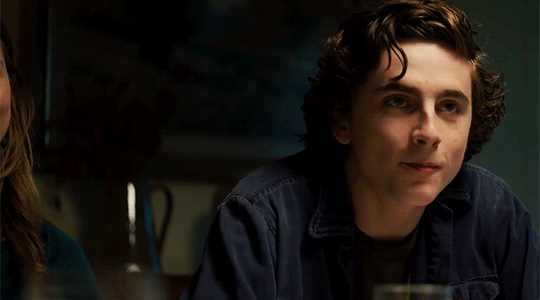
<><><><><>
You didn't have to wait long to see Timothée again. You crossed paths at the pharmacy three days later, where you were shopping for toiletries and other sundries for you and Madison. There was something oddly...final...about buying full-size shampoos and conditioners, instead of the travel-size bottles you packed in California. Like you had finally accepted that you would be here for a while.
You spotted Timothée's distinguishable curly dark hair over on the next aisle. Your heart stuttered. You had hoped not to run into anyone you knew, especially someone with whom you shared a complicated past. Who was I kidding? This isn't a crowded Target in Cali where you can just blend in. You took a deep breath and let it out slowly. Should I say hello? Should I put down my stuff and come back later? [Y/N], stop it. You can't run away from this. It's a small town, and you are here for the foreseeable future. May as well embrace it. Besides, it may be nice to have a friend again, if he's willing after things ended.
You looked up at the signage above to see what was there. You didn't want to embarrass him if he was shopping for something...personal. Ah, shaving accessories. Nothing embarrassing about that. You smiled, briefly reminiscing how the boy you knew could never grow a full beard despite how desperately he wanted to.
You worked up the courage to go say hello. You intentionally came up behind him as payback for startling you earlier in the grocery store. "If I didn't know any better, I would think you were stalking me, Timothée Chalamet."
He quickly spun around, initially looking over your head before looking down to meet your eyes. His big, lopsided grin sent your heart into palpitations again, just as it did over a decade ago. "Well well well, I could say the same about you, [Y/N] [maiden name], or, umm, I guess it isn't [maiden name] anymore," he fumbled and grimaced.
"It is. I'm divorced," you forced out. You still weren't used to saying it out loud. You watched as a whole range of emotions swept over his face before landing on sad, pitying look.
"Oh, I'm sorry to hear that. I wondered if that may be the case when you said you moved back in with your folks. You know, I run into your mother from time to time in town. It was through her that I knew you had gotten married and had a baby. She was always happy to show off pictures." He paused to chuckle. "But she didn't say anything about the, uh..." He gestured awkwardly with his hands.
"Yeah, well, my parents aren't big fans of the d-word. It was a very recent development, too, one they have not yet come to embrace despite not being big fans of Michael." You suddenly found your sneakers very interesting, unable to make eye contact with Timothée.
"Well, hey, I'm just here to grab my dad's meds. I was thinking about swinging by the diner to grab a bite to eat before driving back. Would you like to join me?"
"Uh, sure. Maddy is hanging out with my parents and they aren't expecting me back immediately. Might be nice to have adult conversation again." You chuckled. The two of you paid for your items and walked across the street to the restaurant.
Timothée, ever the gentleman, opened the door for you. Everyone looked up at the sound of the metal bells hitting the glass. Whispers started floating around as soon as you stepped foot inside.
"Is that [Y/N] [L/N]?' "I thought she was in California." "Maybe she's just visiting her family?"
You ducked your head as you felt your cheeks heat up in embarrassment. You followed Timothée to a table in the corner and sat with your back to the rest of the diner, not wanting to see the curious looks. It was somewhat reassuring, though, to know that you still bore enough resemblance to your former self that people recognized you. You hardly recognized yourself in the mirror anymore.
Right as you got settled in your seat, you heard footsteps stop beside you. You raised your head to see that your server was also someone you knew from high school, Amanda. You smiled and softly said hello.
"They said it was you, but I didn't believe them. How are you doing, honey? Where is that baby of yours? Your mom hasn't been by lately to show off any pictures." Only after her barrage of questions did she look across the table. "Hey, Timothée."
"Hey, Mandy," he replied quietly.
"Oh, she's hanging out with my parents while I did some shopping. She's not a baby anymore, though." You pulled out your phone to show Amanda a recent photo.
"She looks just like you, [Y/N]! And they are always babies, no matter how old they get. How old is she? Looks about 9 or 10. I have a 12 year old, almost 13. Practically a teenager!" Amanda pulled her phone out of her apron to show you her lock screen.
"He's very handsome," you offered with a friendly smile.
"How long are you in town for?" she asked.
"Uh, well, I'm not sure. However long it takes to get back on my feet. I recently got divorced, so I am trying to figure out what's next," you replied solemnly as you traced the patterns on the paisley tablecloth with your finger. You were trying (and probably failing) not to give away how incredibly overwhelmed you were feeling. You were grateful when Timothée interrupted the exchange.
"Hey, Mandy, what's the special today?"
"Oh, of course! You are here for a reason, after all. I was so eager to see if it was really [Y/N] that I forgot the menus. I'll be right back." She patted your shoulder before retreating. She returned as quickly as you could mouth "thank you" to him.
The two of you silently scanned the menu and then placed your orders. As you waited on the food, you easily fell into conversation about high school, then your time in California. You had forgotten how easy it was to talk to Timothée. You gleefully showed him pictures on your phone of your favorite landmarks and landscapes until you accidentally swiped to a photo of you, Madison, and Michael together at one of the national parks. The reminders of the fleeting happy times were painful.
Sensing the shift, Timothée grabbed your hand. You felt lightning surge throughout your body from his touch. He squeezed once and then let go just as quickly when he spotted Amanda heading to your table with your orders. You looked up and saw the smirk on her face as she eyed the two of you.
"Enjoy! I'll come back to check on you in a bit."
You turned to look at Timothée. "You know we are going to be the hot gossip for at least the next week, right?" you said playfully.
"Let them talk. There are worse rumors than being spotted with you." He cleared his throat, then popped a French fry in his mouth. "So, was there anything you missed about Tennessee?"
You, you thought automatically. "I eventually came to miss how much simpler things feel here. How life slows down in the woods and the mountains. In LA, everyone is always in a hurry. There is so much traffic. There were so many people, yet it was so lonely. Michael was really my only friend there." You went on, and Timothée listened intently as you provided a high-level retelling of what brought you back.
"...and so I packed up our clothes and a few belongings and drove out here. I got into town about two weeks ago and have been laying low with my tail between my legs." You stared down at your now empty plate in shame.
"Does he stay in touch with Madison?"
"No. He barely saw her after we separated, and he hasn't reached out since we left the state. But she's convinced that he's going to send for her to come live with him once he's settled in his new house in Sacramento with his girlfriend."
He shook his head. "You deserve better than that. SHE deserves better than that." You detected a hint of anger and disgust in his tone.
"Yeah, well, unfortunately, we are both paying the price for my poor decision-making." Your voice was thick with remorse. "She doesn't deserve to pay for my mistakes."
"[Y/N], you can't do that to yourself. You were young. All you can do is make the best of now." Amanda came by and set the check down on the table. You were grateful for her timing because you weren't sure what to say next. Your fingers brushed his as you both reached for the ticket.
"Please, let me get this," he said assertively. "I invited you to join me, remember?" He slid his credit card and the check over to Amanda, whose face was all grin. People were definitely going to hear about this.
You narrowed your eyes with playful scorn. "Fine, as long as you let me get it next time," you rebutted before fully thinking it through.
"Next time, eh?" His eyes lit up as he cocked his head to the side.
You blushed. Whoops. "Umm, yeah, next time. All we talked about was me today. We didn't even get to what you have been up to for the past 10+ years!"
"Fair enough, though that won't take long to tell," Timothée shrugged and signed the receipt after Amanda returned. You both stood and walked out the door to make your way back to the pharmacy parking lot.
"You still have the same truck!" you exclaimed. You jogged the rest of the way and ran your fingers across the emblem on the front. You and he made a lot of...memories...in that truck.
"Yep. Restoring her became somewhat of a hobby when I came back from Texas."
"Texas?" You never knew he left town. From what you remembered, he had never planned on going anywhere, especially not that far.
"A story for another day. Next time, remember?" he smirked.
"Well, maybe we should actually make plans for a next time instead of just hoping we run into each other in town. Here." You handed Timothée your phone. "Plug in your number so we can chat."
This time it was his turn to blush. He took the device from you and called himself. "So I can save your number as well," he offered.
You recognized the digits when you had your phone back in hand. "You never changed your number."
"If it ain't broke, don't fix it."
You laughed softly. "Fair enough."
"Well, I better get going. It was good to see you again, [Y/N]."
Timothée opened his arms for a hug, which you reciprocated. For a moment, all was right in the world with your head on his chest. I missed this. But I can't want this right now, you lectured yourself. You stepped back and gave him space to get into his truck. He rolled down his window to say goodbye once more.
"Tell your folks I said hello, please," you called out over the noise of the engine. His smile fell just briefly.
"You do the same."
<><><><><>
Chapter 4
Masterlist
Tag List: @croatianprincess
#timothée chalamet#timothee chalamet#timothee chalamet x reader#timothée chalamet x reader#timothee chalamet x you#timothée chalamet x you#timothee chalamet fanfiction#timothée chalamet imagine#timothee fanfic#timothee x reader#timothée x reader#reader insert#mom reader#female reader#high school sweethearts#angst#whump#eventual happy ending#single mom#single parent#single parenting
51 notes
·
View notes
Text
So where the hell is Rhadamanthus?
OK, lets list some things we know about the space elevators, orbital ring, and conduit in xenoblade 3:
the orbital ring is around the equator exactly
the orbital ring has three space elevators, Minos, Aeacus, and Rhadamanthus (the world tree)
the conduit/zohar was found in Africa, PRESUMABLY near lake turkana, just north of the equator in Kenya
presumably, the three space elevators are equidistance from eachother, at three different spots on the equator
ok now that we've got that straightened out, lets try and pinpoint the locations of the three stations.
The only one we actually see is Rhadamanthus, and at the end of future redeemed we get to see the surrounding areas.
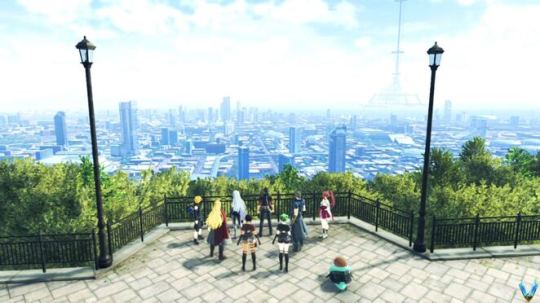
Many people were quick to note how much this looks like California. A sprawling city by the sea with mountains inland. not to mention the obviously american architecture. Hell when we visit the same place in xenoblade 2 we see ruins of road signs made in the american style. Including references to a interstate 236, that doesn't exist

But, obviously, there's no part of the USA that straddles the equator. So we have to look for other locations that fit the bill.
First of all, we know that the flashback to the city in future redeemed takes place during the afternoon, as we hear the radio broadcaster mention that the show is the afternoon news. Shadows point east in the afternoon as the sun is in the west. We see shadows pointing away from the sea in future redeemed, so that must mean that the location of Rhadamanthus is on a west coast.
There are only three countries with a west coast the equator cuts through: Gabon, Indonesia, and Ecuador.
Gabon doesn't fit the bill, it's too flat.
Indonesia has several islands on the ecuator that COULD fit the bill, but I'm really interested in ecuador here.

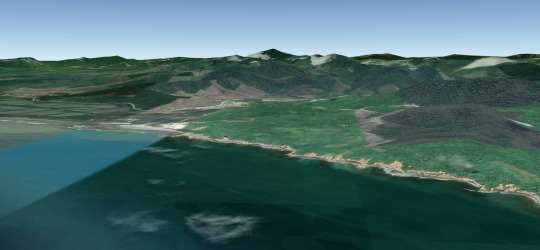
this part of ecuador right on the equator fits the bill perfectly. by the sea, with mountains inland, on the west coast, and there's a BIG reason to suspect rhadamanthus is here, but I'll come back to that in a bit...
For the record, I'm going to assume that the areas around all three space elevators are administered by the USA, or at least the "coalition goverment". We know the USA had a MASSIVE hand in at least Rhadamanthus's management as we see references to the US government in it in xenoblade 2.
I'm imagining it to be a panama canal situation, where only a small strip of land around the space elevator is actually controlled by the USA. Which would explain the road signs and the non existent interstate. (worth mentioning that 236 could be a connecting road to the nearby pan american highway).
Anyway, what about the other two
Well. Obviously one of them is going to be in East Africa right? To the south of lake Turkana. They'd build up from where they found the conduit for sure. So, what are some potential locations?
Well, about 175 miles south of the lake is the city of Nanyuki. Right on the ecuator, and has an airport. Perfect spot for a major development to happen.
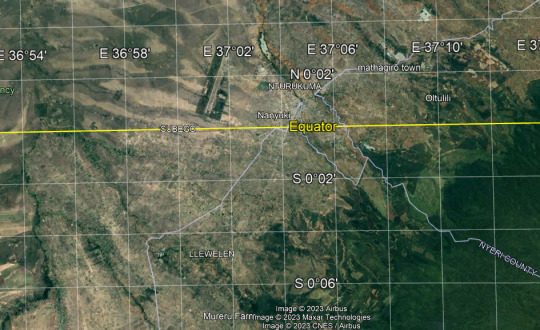
So, what two locations are equidistance from Nanyuki on the equator? Well, to find that we need to divide the circumference of the world into thirds, and then measure that number along the equator from Nanyuki in both directions
the circumference of the world is 40075km, divided by 3 is 13358.33km
To the east 12258km from Nanyuki is...

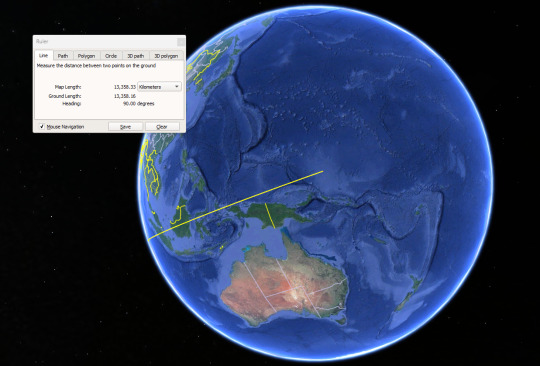
The middle of the ocean... which is fine. There are no three spots on land on the ecuator which are equidistance from eachother. There was always going to be somewhere in the water. But the way i see it, if you can build a space elevator you can build an artificial island. So this probably wouldn't be an issue.
It gets exciting when you go west though, because 13358km west of Nanyuki is...


RIGHT OF THE COAST OF ECUADOR.
Within a margin for error of about 300km too. and if you're building a structure of that scale 300km is nothing. Rhadamanthus could've absolutely been right there on that coast.
Anyway, this has been my TED talk. Rhadamanthus is in Ecuador. Why the conduit is there and not in Nanyuki... well thats a whole different question to ask.
#xenoblade#xenoblade chronicles#xenoblade 2#xc2#xc#xc3#xenoblade chronicles 2#xenoblade chronicles 3#xenoblade spoilers#xenoblade chronicles spoilers#xenoblade chronicles 2 spoilers#xenoblade 2 spoilers#xenoblade chronicles 3 spoilers#future redeemed#future redeemed spoilers
122 notes
·
View notes
Text

@ellakas I'm so glad you asked!
Zachary Taylor is one of those presidents that no one talks about in history class. But the thing is, in the 1840s, everyone was talking about him. He was the war hero of the Mexican-American War. The war itself (a blatant land grab by President Polk) was unpopular, but Taylor emerged as a beloved hero, because was a really good military commander, and because stories emerged about how humanely he treated Mexican prisoners.
Taylor was so popular that both political parties asked him to be their candidate in the next presidential election. He had never held political office. Never shown interest in politics. He had never even voted in a presidential election before! (His reasoning was that, as a military man, he didn't want to serve a commander-in-chief that he had voted against). Yet he was eventually persuaded to run--and win--as the Whig Party candidate.
(Fun fact! His wife, who had no interest in being a politician's wife, prayed that he'd lose the election. Taylor also showed his religious convictions by refusing to be sworn in on a Sunday, so his inauguration was delayed by a day, leaving the US president-less for twenty-four hours).
Even after he was president, Taylor had no interest in playing politics. He wanted to serve the country, not the party. He refused to play political games, purposely not appointing some of the big names of the party to his Cabinet so he could have more diverse voices representing a wider swath of the country. Still in the military mindset of "I give orders and people obey", he was frustrated that he was constantly questioned by Congress, and was very much at odds with them.
The big issue of his presidency was the fact that the US had just gained a ton of land from Mexico, and they had to decide if they'd enter the Union as slave or free states. Since Taylor was a slave-owning Southerner, the Southern Democrats hoped he'd side with them. But Taylor didn't want to expand slavery. First, because it's dumb--it's not like we can grow cotton or sugar in New Mexico or Arizona, so why would we even need plantations? But also because he was coming under the influence of some of the most vocal anti-slavery New York Whigs. To the great anger of the Democrats, Taylor said he wanted California to enter immediately as a free state, and would prefer all the territories to be free states. Before the issue could be resolved, he died. He got violently ill after Fourth of July celebrations in 1850 (because the White House water was still contaminated by human feces), and died five days later, after only a year and a half in office.
A year and a half isn't much time to make an impact. But I'm still fascinated by this president. He was a wonderful mess of contradictions. He was a Southern slave-owner who joined the Northern anti-slavery party. He was against all talk of secession--on the grounds of "I spent forty years serving this country and I want it to stay in one piece"--even though his son-in-law was (I'm not kidding) future president of the Confederacy Jefferson Davis. As a slave-owner and US military leader in the 1800s, he logically can't be a totally good guy, yet I get the sense that he was genuinely trying to be, in the context of his time. And he was showing signs of further character development. If he had lived, who's to say what he could have become, what he could have done?
But we'll never know, because his death left the country in the hands of Millard Fillmore, possibly the most aggressively mediocre man ever to become president (though I have high hopes for Chester Arthur). He actually has a pretty amazing origin story. He was the son of a dirt-poor farmer who apprenticed him to a cloth-maker in what became an indentured servitude situation. He scraped up enough money to buy his freedom and return home. Growing up, the only book he had to read was the Bible, until he turned 17 and bought himself a dictionary. At 20, he started taking adult classes to finally get the education he'd been denied; his teacher was a woman two years older than him who he eventually married. He became a lawyer, and then went into politics, serving in the New York State Legislature. He authored no significant bills. Made no big impact. The main traits people noticed about him were "tall" and "good-looking" (Queen Victoria did later call him the most handsome man she'd ever met). He was just kind of... there.
He was picked as Taylor's vice president for much the same reason Taylor was recruited as presidential candidate--he was moderate enough to appeal to both sides of the polarized political spectrum. New York was the home of the most vocal anti-slavery Whigs, but Fillmore was moderate on the slavery issue. As vice president presiding over the Senate, people mentioned he was "very fair" in how he let both sides speak. And that's like...the best people can say about him.
The question of the slave states eventually produced a bill that came to be known as the Compromise of 1850. Taylor--the enemy of compromise--was against it. Fillmore, a few days before Taylor's death, stated he would support it. After Taylor died, his entire Cabinet resigned rather than serve under a president who supported the Compromise. When the bill passed, Fillmore signed it into law.
The Compromise stated 1) California would enter the union as a free state; 2) the slave trade would end in Washington D.C.; 3) The other territories would decide for themselves if they wanted to allow slaves or not. Most importantly, it put the Fugitive Slave Act into effect, requiring all citizens, even in Northern states, to help return runaway slaves to their owners. The North was outraged over the Fugitive Slave Act; they wanted nothing to do with the practice of slavery and now the government was forcing even free states to support the institution. This law was meant to bring together both sides and prevent war, but it probably had the opposite effect, deepening the divide and hastening the plunge toward armed conflict.
This has led historians to speculate--if the more forceful, principle-driven Taylor had lived, could the path to Civil War at least have been delayed? No way to say, of course; maybe Taylor's solution would have made things worse. But the contrast between these two presidents is so fascinating. In Taylor, you have the apolitical war hero who sticks to his guns--the increasingly anti-slavery slave owner. Meanwhile, Fillmore is a bland politician from the most anti-slavery state who refused to speak against slavery--a man who never really achieved anything because he never really stood for anything. They're such complex characters, full of irony and contradictions, and I'm outraged that my history classes completely skipped over them on the way to Lincoln.
#history is awesome#answered asks#ellakas#my reaction to the taylor episode was outrage i'd never known any of this#the only thing animaniacs taught me about him was he 'liked to smoke his breath killed friends whenever he spoke'#(which is a tidbit the podcast failed to mention)#i feel like there should have been *something* about this guy's ridiculously colorful life worth mentioning#now i'll have to fight the urge to track down my brother again to tell him i forgot to mention the jefferson davis thing#talk about irony!#presidential talk
183 notes
·
View notes